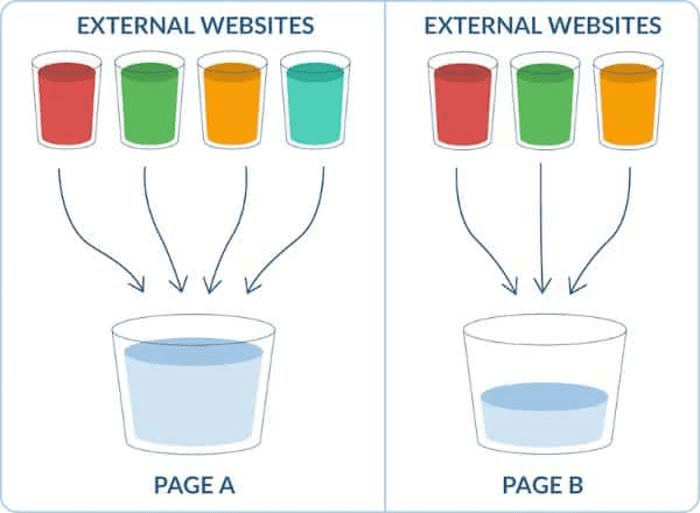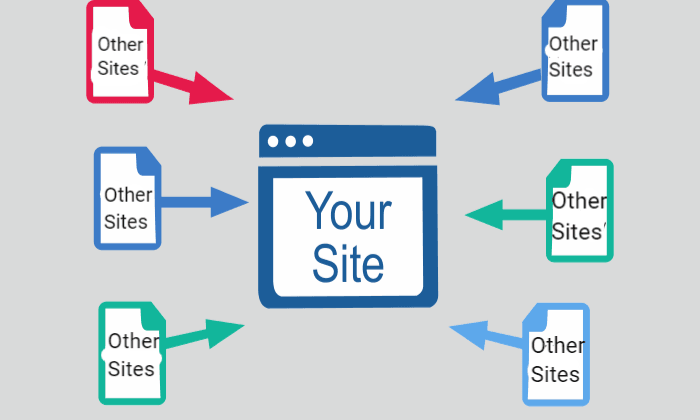Helpful Summary
Overview: This comprehensive guide introduces the important keyword metrics that drive SEO success, along with the best tools to track them.
Why you can trust us: We developed Keyword Metrics, a tool that improves on the capabilities of Google Search Console, so we have deep expertise in identifying the most relevant metrics for selecting SEO keywords.
Why this is important: Considering these metrics ensures that your SEO strategy targets the most impactful keywords.
Action Points: Factor these 14 important keyword metrics into your SEO strategy to select the most effective keywords, track performance, and refine your content for improved search engine rankings.
Further Research: Use Keyword Metrics to track, analyze, and refine the essential metrics that drive your SEO success.
Want to Assess the SEO Value of a Keyword?
SEO can be complex, with ever-changing algorithms and keyword optimization challenges. While you can't control these factors, you can improve your website's ranking by focusing on valuable keywords.
But how do you determine if a keyword is worth your investment?
This article explores 14 key metrics to evaluate keyword potential and enhance your SEO strategy. We'll also discuss the best tools for tracking these metrics. These metrics can be applied to both new content and existing content optimization.
But before we do that…
Why Trust Us?
With our tool, Keyword Metrics, we've assisted numerous website owners in identifying and ranking for relevant keywords, significantly boosting their search rankings, visibility, and traffic.
These experiences have equipped us with valuable insights into selecting the right keywords and evaluating the essential metrics for a robust SEO strategy.
Why Keywords Metrics Matter for SEO
Keyword metrics—not to be confused with our tool, “Keyword Metrics”—refers to the parameters used to evaluate the value and effectiveness of keywords in SEO. These metrics help assess how well a keyword drives traffic, improves search rankings, and meets marketing objectives.
Understanding and factoring in keyword metrics is crucial, why?
Keyword Research: Identifying suitable keywords is just the start. Measuring their impact ensures they effectively enhance your content’s visibility and performance.
Avoiding Wasted Efforts: Without proper metrics, you risk investing time in ineffective keywords, leading to suboptimal results and delayed benefits.
Enhanced Results: Accurate metrics guide you in choosing relevant keywords, improving search rankings, and maximizing ROI, ensuring your content attracts the right audience.
Top 14 Metrics for Selecting SEO Keywords
1. Search Intent
Search intent is the underlying purpose behind a user's query. By understanding search intent, you can target keywords that align with your target audience's needs and interests.
Search intent can be:
Informational: Users seek knowledge or information (e.g., "What is SEO?")
Transactional: Users intend to purchase a product or service (e.g., "buy best SEO tools")
Informational keywords often include words like "what," "who," and "when," while transactional keywords may include "best," "buy," and "order."
Why is search intent important?
New Content: Ensures your content meets your target audience's needs
Content Updates: Helps you modify your approach to better match current user expectations
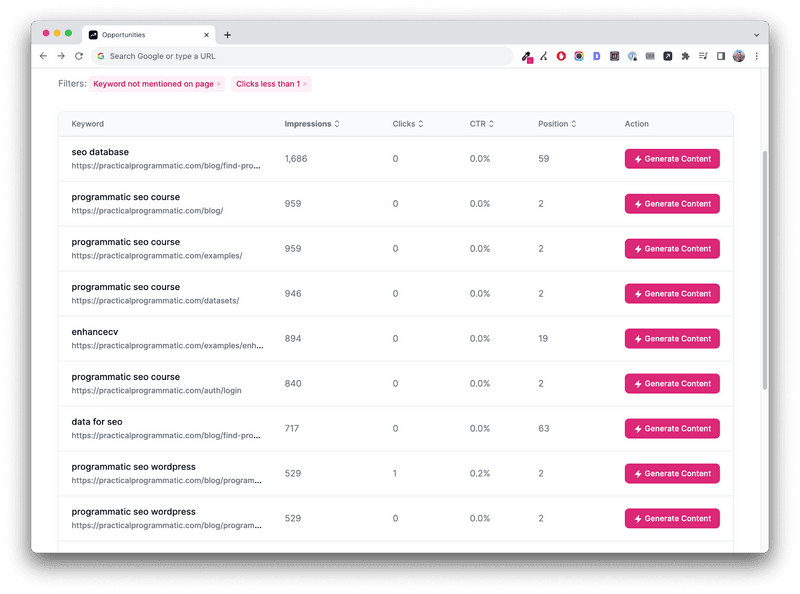
Using Keyword Metrics to Uncover Search Intent:
Query Analysis: Analyze search queries related to your target keyword to get insights into what users are actually searching for when they enter that keyword.
Related Keywords: Get related keyword suggestions that users often search for along with your target keyword. This helps you understand the context in which people are using the keyword.
Content Analysis: Analyze the content of your pages that rank for the keyword to identify the topics and themes that are being discussed.
2. Keyword Commercial Value
Commercial value assesses a keyword’s potential to generate revenue, focusing on its ability to convert visitors into customers. While some keywords drive traffic, those with high commercial value are crucial for conversion-driven strategies, as they directly impact your bottom line.
However, keywords with high commercial value might also be more competitive, requiring additional resources to rank.
Tools like Ahrefs can help measure this value by providing data on cost-per-click (CPC) and competition levels.
A high CPC indicates that advertisers are willing to pay more for that keyword, reflecting its perceived value in driving conversions. This suggests that the keyword is not only commercially valuable for paid advertising but also holds significant potential for SEO.
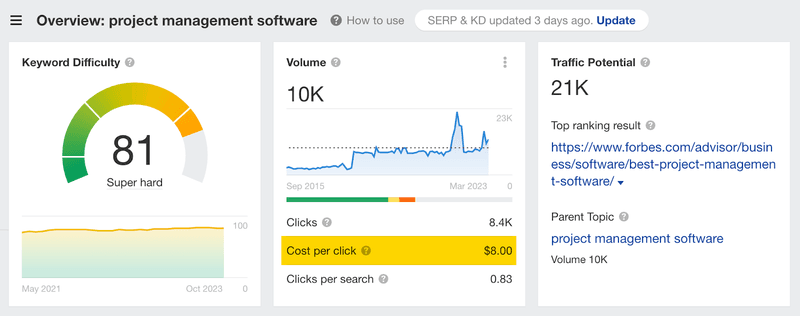
After implementing content around high-value keywords, use Keyword Metrics to track your rankings for these keywords, allowing you to continually refine your focus on the most profitable terms.
3. Keyword Difficulty
While measuring commercial value is important, it's equally essential to assess keyword difficulty. Established websites often dominate high-difficulty keywords, making it challenging for newer websites to compete. However, you can target high-value keywords with low to medium difficulty for better ranking opportunities.
Why is keyword difficulty important?
Keyword Selection: Helps you choose keywords you can realistically rank for
Content Updates: Determines whether further optimization is needed to improve or maintain your ranking
Tools for Assessing Keyword Difficulty:
Ahrefs
SEMrush
Keyword Metrics (to track the keyword rankings over time, allowing you to adjust your strategy based on performance).
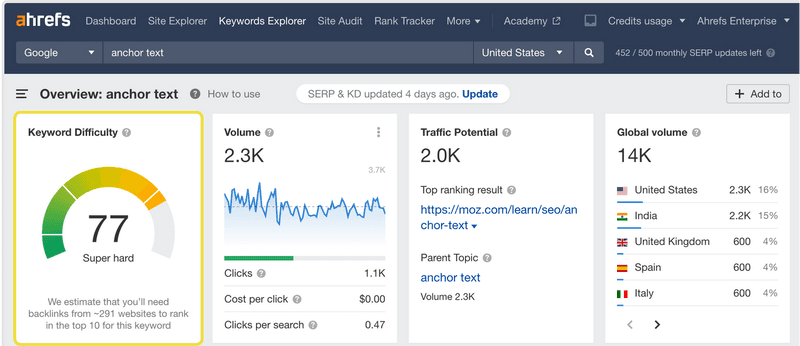
4. Keyword Opportunity
Keyword opportunity is a crucial metric that reveals the potential for your content to rank higher in search engine results. By identifying keywords where you have a strong chance of improving your ranking, you can strategically focus your efforts on the most promising opportunities.
Why is Keyword Opportunity Important?
Optimize Existing Content: Enhance your existing content to target high-opportunity keywords and improve your search engine rankings.
Create New Content: Develop content around promising keywords to quickly gain visibility and attract more traffic.
Prioritize Efforts: Focus on the most impactful keywords to maximize your SEO efforts and achieve faster results.
Keyword Metrics integrates seamlessly with Google Search Console to help you uncover keywords for which you already rank. By applying a combination of filters, you can identify new opportunities for improvement. For example:
Keywords Filter: Set to "Keywords not mentioned on the page" to identify keywords you're ranking for but not directly targeting.
Impression Filter: Set to a threshold (e.g., 100+) to focus on keywords with significant impressions.
CTR Filter: Identify keywords with low CTR.
Position Filter: Focus on "Keywords ranking on page 2" to target keywords that are close to reaching the first page.
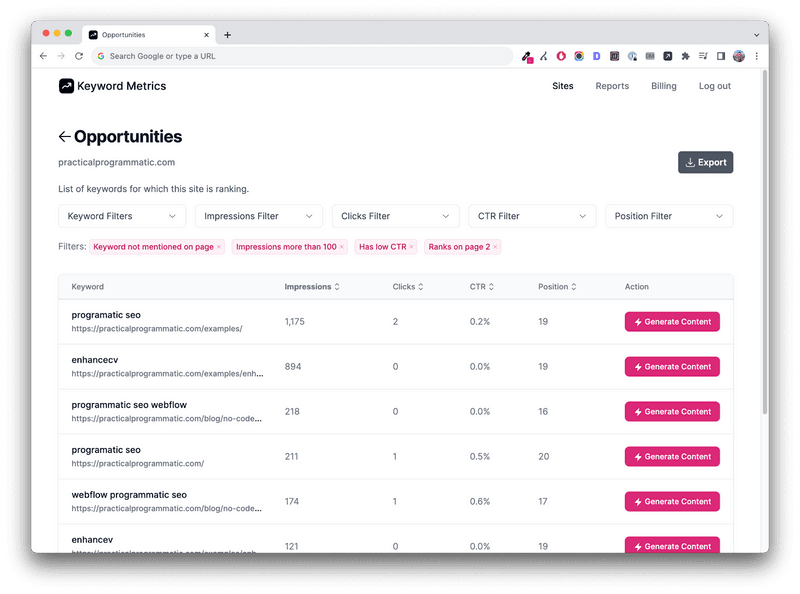
5. Keyword Impressions & Click-Through Rate (CTR)
Keyword Impressions measure the frequency with which content related to a specific keyword appears in search results. A high impression count indicates that your content is being seen by a significant number of users.
Click-Through Rate (CTR) measures the percentage of users who click on your search result link after seeing it. A high CTR suggests that your content is engaging and relevant to the search query.
Why are Impressions and CTR important?
Content Relevance: A high impression count combined with a low CTR may indicate that your content is not relevant to the search query. Conversely, a high CTR with low impressions suggests that your content is highly relevant but not being seen enough.
Content Optimization: Analyzing both impressions and CTR can help you identify opportunities to improve your content's titles, meta descriptions, and overall relevance.
Keyword Strategy: Understanding the relationship between impressions and CTR can inform your keyword strategy. For example, if a keyword has high impressions but low CTR, you might consider optimizing your content or targeting different keywords.
Using Keyword Metrics to Track Impressions and CTR:
Integration with Google Search Console: The tool connects to your Search Console account, pulling in data on your website's search performance.
Data Analysis: Keyword Metrics can provide detailed insights into the impressions and CTR for your target keywords, including visualizations and reports.
Actionable Insights: By analyzing this data, you can identify trends, evaluate the effectiveness of your content, and make data-driven decisions to improve your SEO.
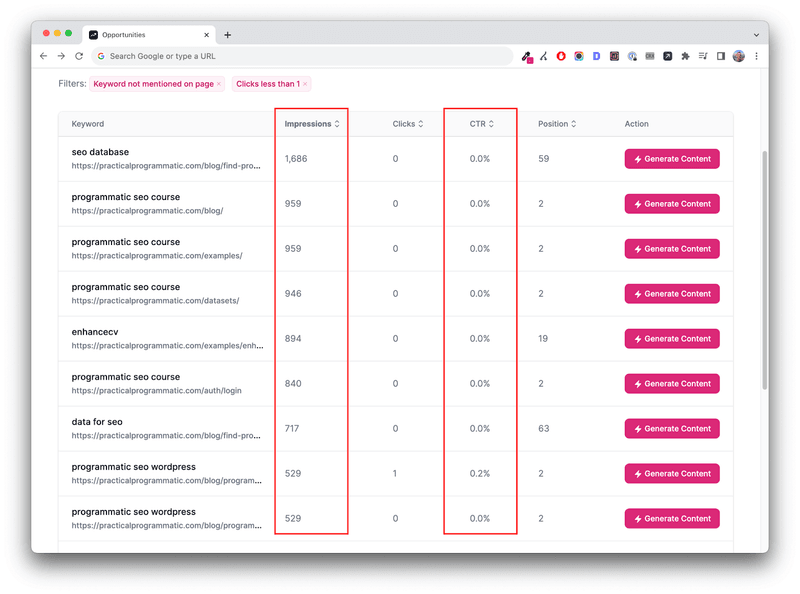
6. Keyword Average Position
Keyword average position refers to the typical ranking of a specific keyword on search engine results pages (SERPs) over time. A higher average position (closer to #1) generally indicates better visibility and potentially more traffic.
Why is the average position important?
Visibility: A higher average position means your content is more likely to be seen by searchers.
Traffic: A higher ranking can lead to increased organic traffic to your website.
Engagement: Users are more likely to click on higher-ranked results, which can lead to increased engagement with your content.
Key considerations:
Fluctuations: Average position can fluctuate due to various factors, such as algorithm updates, changes in competition, and seasonal trends.
Combined Analysis: To get a more accurate picture of a keyword's performance, consider combining average position with other metrics like impressions and click-through rate.
Using Keyword Metrics to track average position:
Integration with Google Search Console: Similar to CTR, Keyword Metrics connects directly to your Search Console account. This allows you to pull data on the average position of your pages for specific keywords.
Calculating Average Position: the average position for each target keyword is deduced based on the rankings it has achieved over a specified period.
Actionable Insights: Get visualizations and reports that show how your average position is changing over time.
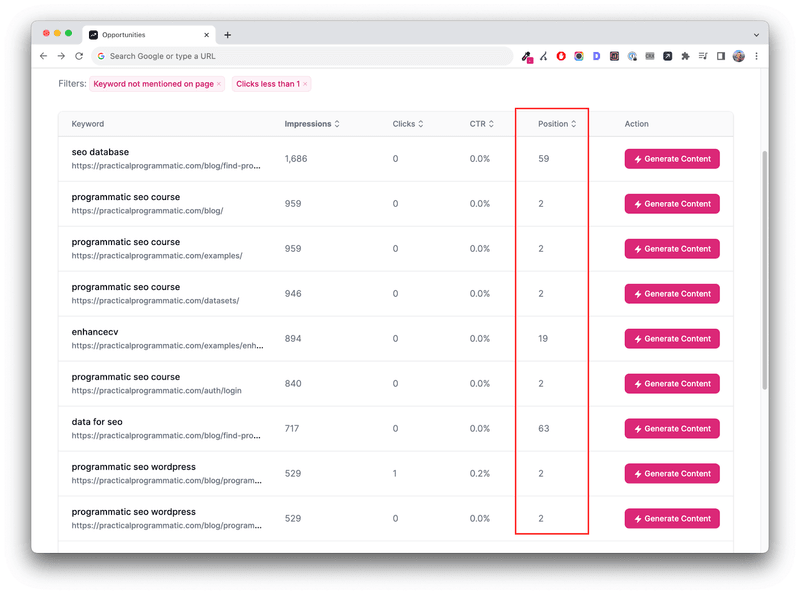
7. Search Volume & Search Volume Over Time
Search volume measures the number of keyword searches within a specific period, typically monthly. It indicates the potential traffic you can attract using that keyword.
While search volume is often the initial metric considered, it's not enough on its own. Some keywords may have high search volume but be irrelevant to your target audience.
Search volume over time is equally important. It reveals whether interest in a keyword is growing or declining, helping you determine its long-term potential.
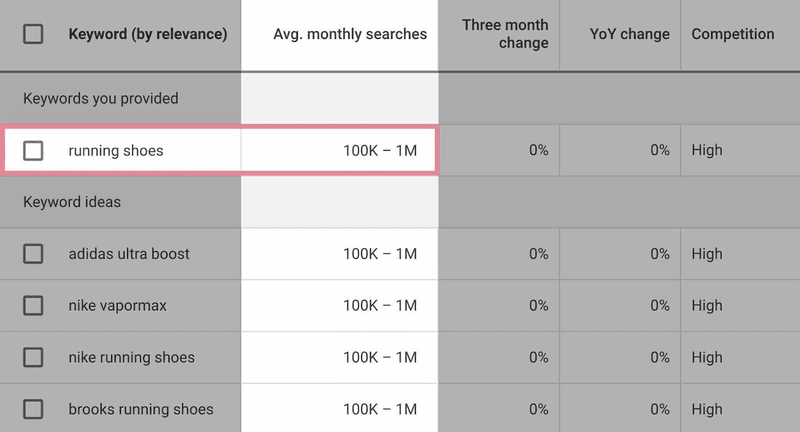
Tools for Analysis:
Google Keyword Planner
Ahrefs
Keyword Metrics (for identifying high search volume keywords you already rank for)
By combining these tools, you can effectively analyze search volume and identify keywords that align with your target audience and offer long-term growth potential.
8. Keyword Relevance
Keyword relevance measures how closely a keyword aligns with your content and target audience. Even if a keyword has high search volume and low difficulty, it won't deliver results if it doesn't resonate with your audience.
Why is keyword relevance important?
Target Audience Alignment: Ensures your content attracts the right audience
Engagement and Rankings: Increases the likelihood of higher engagement and better search engine rankings
Google Keyword Planner helps you find keywords relevant to your website, even if they may not be immediately apparent.
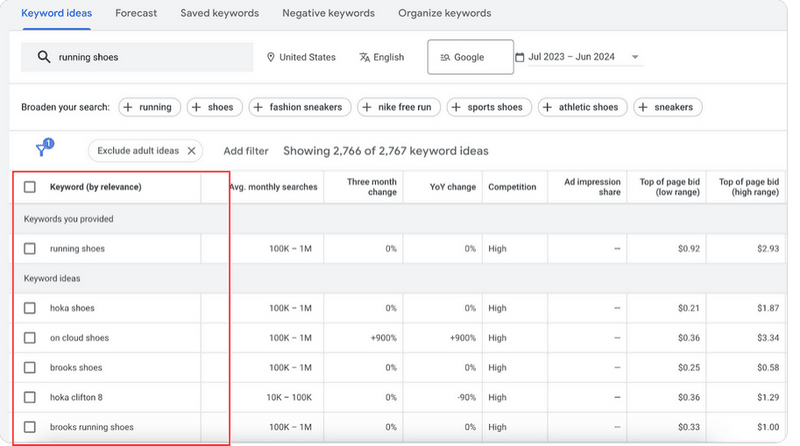
9. Keyword Ranking Velocity
Keyword ranking velocity measures how quickly a web-page moves up or down in search engine rankings for specific keywords. It indicates the speed at which a page gains or loses visibility.
Why is ranking velocity important?
New Content: Helps you understand how quickly you can gain visibility using certain keywords.
Content Updates: Reveals the effectiveness of your optimization efforts.
Competitive Insights: Identifies competitor keywords leading to increased traffic and clicks, allowing you to prioritize relevant and user-focused keywords.
Semrush offers advanced features for tracking keyword ranking velocity, including daily rank tracking and competitor analysis.
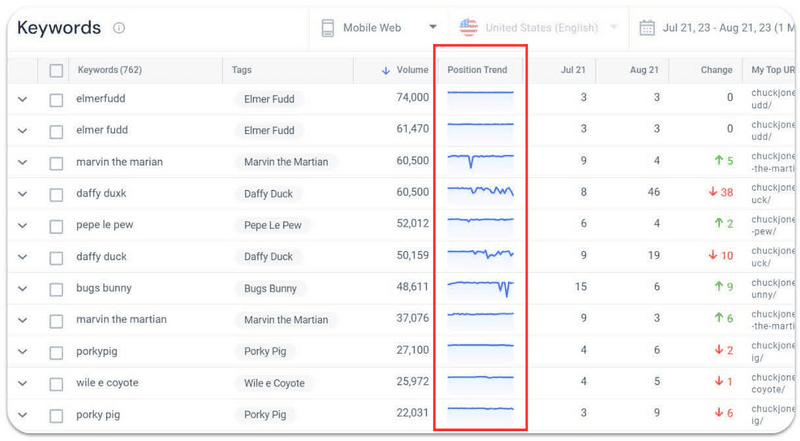
10. Competitor Ranking Position for the Keyword
Analyzing competitor rankings for your target keywords provides insights into the level of competition and the effort required to outrank them.
Why is competitor ranking important?
Competition Assessment: Helps you understand the competitive landscape and identify potential challenges.
Keyword Selection: Guides you in choosing keywords where you have a realistic chance of competing.
Content Optimization: Provides insights into the factors contributing to your competitors' success, allowing you to optimize your content accordingly.
Ahrefs offers in-depth analysis of competitor rankings, including the keywords they rank for and their performance. Complement this by tracking how your content compares to competitors over time using Keyword Metrics.
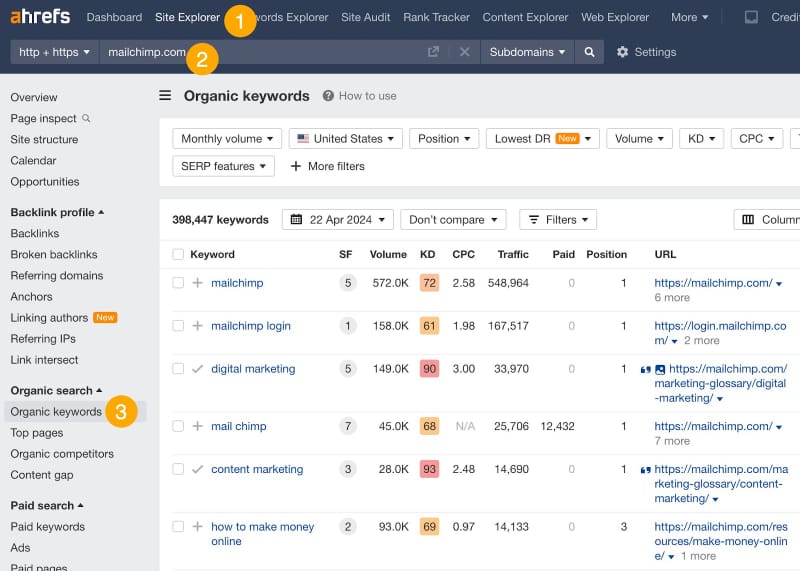
11. Keyword Trends
Keyword trends reveal how interest in a keyword has changed over time. By tracking keyword trends, you can identify emerging opportunities and avoid declining keywords. This helps you target terms that drive traffic both now and in the future.
Why are keyword trends important?
New Content Planning: Helps you identify keywords that are gaining or losing traction.
Content Updates: Guides your decision on whether to focus on current keywords or shift to more promising alternatives.
Google Trends offers valuable insights into keyword trends, including search interest evolution, comparisons between multiple keywords, and trends by region and category.
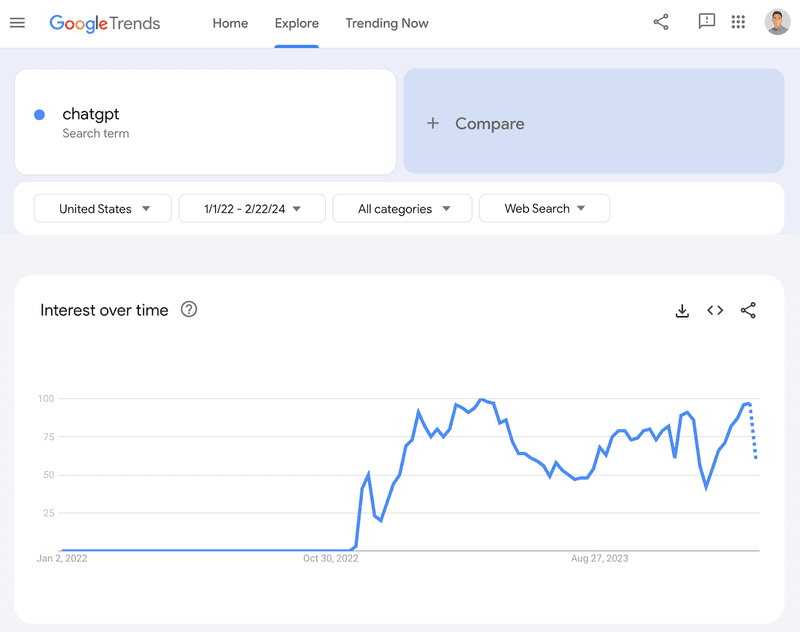
12. Average Domain Authority Ranking for the Keyword
Domain authority is a measure of a website's overall strength and its potential to rank well in search engine results. Tracking average domain authority for the top 10 ranking pages in your target keyword's search results provides valuable insights into competitiveness.
Why is average domain authority important?
Competitive Analysis: Helps you assess the strength of your competitors and your own website's potential to rank.
Keyword Selection: Guides you in choosing keywords where you have a realistic chance of competing.
Content Optimization: Helps you identify strategies to improve your website's authority, such as acquiring backlinks or creating high-quality content.
Install the Free Ubersuggest Chrome extension to quickly see the domain authority of any website in the Google SERPs.
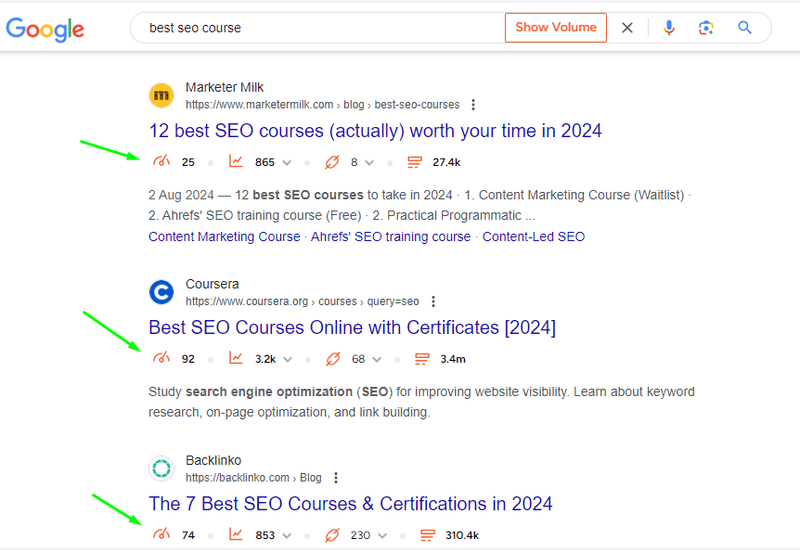
13. Average Word Count of Top-Ranking Pages for the Keyword
Analyzing the average word count of top-ranking pages for your target keyword provides insights into the content length favored by search engines. This is particularly important for informational keywords, where longer content is often preferred.
Why is word count important?
Content Length Benchmark: Sets a benchmark for your content's length to improve your chances of ranking well.
Content Optimization: Helps you determine whether to extend or deepen your existing content to match the preferred length.
Install the Free Detailed SEO Chrome extension to quickly check the word count of any webpage.
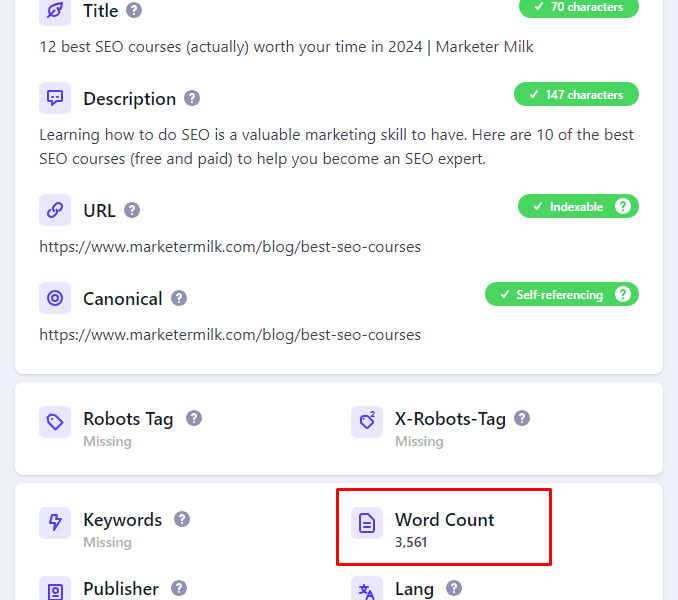
14. Depth & Breadth of Existing Content on the Keyword
Analyzing the depth and breadth of top-ranking content for your target keyword provides insights into the level of detail and topic coverage required to compete effectively.
Why are depth and breadth important?
Content Creation: Helps you create more comprehensive and competitive content that can outrank existing pages.
Content Updates: Guides you in identifying areas where you can improve your content's depth and breadth to enhance your rankings.
Tools for Improving Content Depth and Breadth:
Surfer SEO: Analyzes your content to identify keywords present in the top 10 search results that are missing from your content.
Keyword Metrics: Integrates with GSC to provide insights and identify key areas where you can add more detail or cover additional subtopics, making your content more comprehensive and competitive.
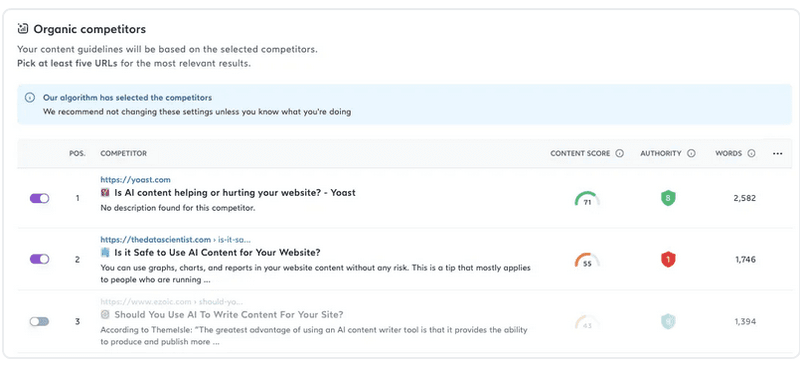
Best Practices for Choosing Keyword Metrics for SEO
Benchmark Your CTR Over Ranking Positions
Understanding how your Click-Through Rate (CTR) varies by ranking position can offer valuable insights for optimizing titles and meta descriptions. If a high-ranking page has a low CTR, it may indicate that your title or meta description needs improvement. Benchmarking your CTR helps refine these elements to maximize traffic from existing rankings.
Focus on Queries in Positions 2-20
Target keywords where your content already ranks within the top 20 positions but not #1. These keywords have the highest potential to move higher with some targeted optimization. Prioritizing these queries can lead to quicker wins and a more significant impact on your SEO efforts.
Consider Your Main Geographical Markets
When selecting keywords, factor in the geographical regions most relevant to your business. This ensures your content aligns with the search behavior of users in those areas, improving relevance and effectiveness in driving targeted traffic.
Triangulate Keyword Metrics with Google Analytics Data
Combine insights from Keyword Metrics with data from Google Analytics to gain a comprehensive view of your content’s performance. By triangulating these metrics, you can better understand how keywords are driving traffic, how users are engaging with your content, and where there are opportunities for optimization. This approach ensures a more accurate measure of your SEO efforts and helps you make informed decisions to improve your strategy.
Prioritize Google Search Console Over Third-Party SEO Tools
While third-party SEO tools offer valuable insights, Google Search Console provides the most accurate and direct data on how Google views and ranks your site. Prioritizing GSC alongside Keyword Metrics ensures your strategy is based on the most reliable information, particularly for metrics like impressions, CTR, and average position.
Master Keyword Research and SEO with Keyword Metrics
Don't let keyword research and SEO be a struggle. We've covered the essential metrics for analyzing keywords and determining their value.
By considering these 14 metrics, you can optimize your keyword research and uncover suitable keywords.
Keyword Metrics integrates with Google Search Console to streamline your keyword research. It helps you identify high-traffic keywords and optimize your content to boost traffic and achieve higher rankings.
Sign up today and take your SEO strategy to the next level.

